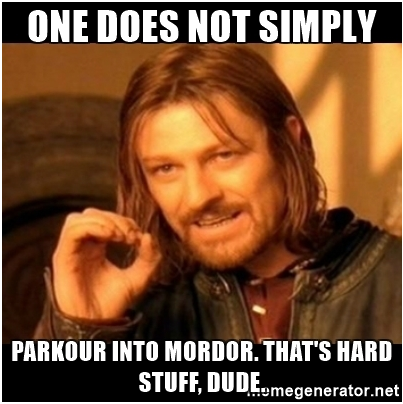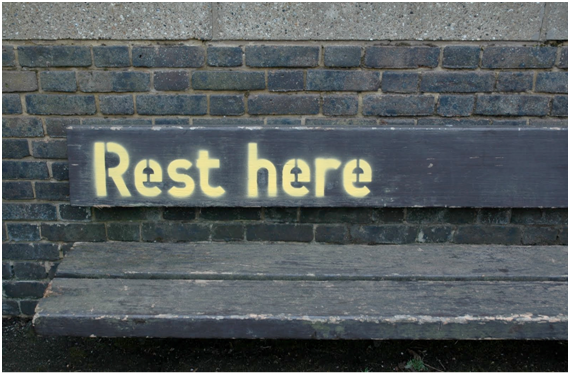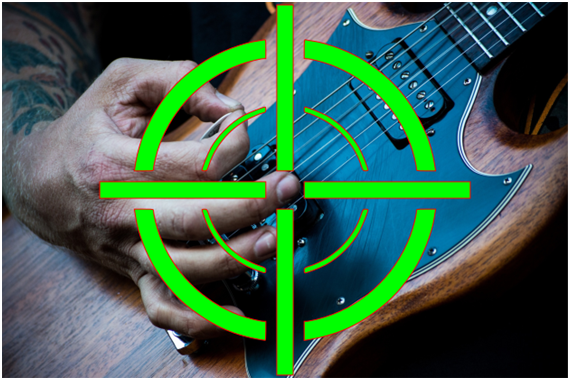HOW HARD IS LEARNING TO PLAY GUITAR?
7 steps to hacking your inner psychology behind learning to play guitar, to make sure you get where you want to be without setbacks and in record time.
“All things at first appear difficult.”
– Chinese proverb
I’ve been doing all kinds of sports and exercise throughout my life, ranging from basketball, football (soccer for all you Americans), weight lifting, to martial arts (Kenpō and Shotokan), tennis, even rugby and American football.
I’ve even played golf for a while too, although we all know golf is neither a sport nor exercise.
So a couple of years ago I stumbled upon something very weird. I stumbled upon a video that was featured on a news website, from a guy named Ronnie Shalvis who was dressed up as Santa Claus and doing flips and stunts around town.
“That’s amazing!”, I thought. I’d never seen any stuff like that before, and I immediately got to his YouTube channel and took a look at his videos. There it was that I learned that that sport was called Parkour, and that it involved a lot of stuff like climbing, jumping, as well as acrobatics.
I was eager to do something new, and since I didn’t want to go back to weight lifting I decided to give parkour a shot. I found out a group of people in my city that practiced it and got together to start learning something.
I’m a pretty big guy. I’m 1,9mts in height (6’3”) and 95kgs in weight (210lbs). Given those credentials, the first thing that my family and friends told me was:
“Are you crazy? Did you bump your head when you were little?””
“That stuff is for younger guys.”
“You are far too big and heavy for that.”
Blah, blah, blah…
Being as stubborn as I am, I chose to do it anyways.
I must say that I did have a lot of fun learning to do vaults and even some flips. In fact, doing parkour actually gave me an “excuse” to get in better shape, which in turn got me into calisthenics and now I work out 4 times a week at home.
Did I expect it to be easy? Of course not, I’d never done any sport even remotely like that.
Did I expect to become world-class? No, I got into it just because it looked like fun, given the fact that I was not willing to go back to my previous sports.
However, when I think about just what it is that got me started into parkour, there are a multitude of things I could tell you. My personality is quite rare, as I usually look for new things to do and experience, regardless of what society/family/friends expect from me.
I can, though, tell you that there are rarely any actual limitations. What if I can’t walk? Well, you’ll be amazed to hear that there are examples of guys who are missing a leg and still manage to do parkour, even flips. Don’t believe me? Check it out right here.
It would have been easy for me to see what parkour was and say:
“Wow, this is very difficult, I’ll never be able to do this, plus I’m older and heavier, so I should just watch it from the sidelines.”
That would have been easy, in fact, but that would have meant that I would have remained forever with the “what if” bug…
Of course, this is just an example, but you can replace all the instances of “parkour” with “guitar practice” and it’ll be exactly the same situation.
In this lesson, I’m going to show you 7 mindsets you can start applying right now to make sure you know how to approach guitar practice including:
- Preventing overwhelm and hopelessness.
- How to get un-stuck, which will happen.
- Enjoying yourself.
If you follow these guidelines, you’ll be on your way to start learning a new skill as fun as playing the six-stringed instrument with as little overhead as possible.
Like a BOSS.
1) Everything is hard.
Of course it is, what did you expect?
Let’s be honest with ourselves. If stuff were to be easy, what would there be to stop everyone from doing just about anything? How long would the world survive in such a way?
Things, especially the nice ones, are difficult to accomplish.
You don’t just get yourself a nice vintage Sunburst Fender Strat from the 60’s because you want it, you have to work for it.
Yes, I’m a Millenial and I recognize we’ve been pampered excessively into thinking that if you want it strongly enough “it will happen”, but I’m afraid the “Law Of Attraction” only works in Peter Pan’s stories.
You don’t just get your way easily. Like Boromir says:

We all know that it would have been much easier to have the damned eagles take the Hobbits into Mordor, but hey, if all were so easy, where would there have been any fun at all?
That leads us to another interesting factor : our brains are hard-wired to give less importance to things that are abundant and easily available.
We don’t really give much thought into the air we breathe because it’s so abundant, even though it’s paramount to our survival. We do that because we rest assured that there’s enough air to go around.
Let’s say you have a car. Do you think your car is not important? The Hell you won’t, I’m sure you take care of it every opportunity you get, but why is that? You hardly need it to survive, but yet you take care of it much more than maybe caring for the food you eat. Now that I think of it, given the poor health of most Westerners, this is particularly true.
Is that a paradox? Maybe it is, but the thing is that it is real.
Bussiness owners will know that whenever you give something away for free, you get much less customer interaction. That doesn’t mean that what you are giving away is worthless, it’s just that people don’t take free stuff too seriously.
Yes, unless you are some freak of Nature, which I assume you are not, then you don’t either.
If you have to work for it, suddenly the perceived value skyrockets! If you have to save for a year to buy that sweet Gibson Les Paul you’ve been eyeing on the store for months, of course you are going to value it a lot.
I want you to hammer this into your head, right now.

Why is guitar playing hard? Because it’s valuable, and because it is valuable, it means it’s something worth putting effort into.
2) Choose quality time over quantity.
Time…
Time…
It’s always about time.

So many times I’ve talked to people about a new thing I want to do, be it a new sport, or just about any other thing, like getting into woodworking, and people always say the same thing:
“That sounds interesting, but I just don’t have time to do it.”
That’s total BS!
You know that kind of people. They are the kind that will lie to you in your face saying that they don’t have time to practice a new skill, but then you look at their Facebook feed and find out that they spent 2+ hours last night sharing funny memes and kitty videos.
No time my rear parts! I get it, kitty videos are fun…
You can argue with me all day long, but I’m positive that at least 80% of people who use time as an excuse are either:
- Lying.
- Not really interested.
- Don’t have their priorities right.
Didn’t your mother tell you it’s better to have fewer clothes of higher quality than lots of cheap clothes?
If she didn’t, then I’m telling you right now. It is true; Nature works that way and I don’t know why.
If you are one of those who thinks that you won’t have enough time to learn to play guitar, then I’m here with my wand ready to shout Expelliarmus and get that poor excuse off your head for good.
Yes, because it’s just an excuse.
If you can squeeze enough time to watch your favorite Netflix show every day, then you certainly have enough time to play guitar.
You don’t need a lot of time. If you can schedule as little as 30 minutes a day to hit those strings, it’s good enough, provided, of course, that you can have those 30 minutes in one sitting, not in 5-minute intervals all throughout the day. This shouldn’t be a problem if you are already wasting time watching TV, which you probably are.
If you can get a minimum of three hours of practice per week, even if at 30 mins a day, you are all set.
Of course, more time does not always mean better results.
Humans behave weirdly with time. The same way as a gas will always fill its container, so will we fill all the free time we have, even if we are doing nothing.
Now, I said that you should choose quality time over quantity, right?
Quality time has to do with a minimum of time applied to your practice, but also with how much intensity and intention you put into it.
This is the exact reason why HIIT workouts are so much more effective at building muscle and burning fat than cardio exercise.
You don’t need a lot of time, but you need to put that time to good use, and knowing how to put that time to good use will make your learning process much easier.
If it does get easier, then like Cal Newport shows in his book “So Good They Can’t Ignore You”: we tend to enjoy the things we find easier to do.
3) Know when to take a break.
Surely you will know this proverb:
“All work and no play makes Jack a dull boy”
Look, it’s perfectly fine to feel down every now and again. There’s no shame in it.

You have felt it, and so have I. Probably multiple times…a week…
I’m sure you’ve been told many times that if you want to excel at something “you have to work, work, work, and keep it up”. Even though there’s truth in that, it’s not really useful to keep putting in time on practicing when you are tired, or just don’t have your mind into it.
Our brains need time to take in the new skills we are practicing. Exerting your muscles and tendons is good, as long as you take a break and let them set in and grow stronger.
Most trainers will always tell you to take at least one day off a week to rest and recover. Not only this is good for your body, but it is also good for your mind. Taking a break and resting is just as important as the work itself.
I’m sure you’ve read, heard, seen, and even smelled about multiple studies regarding the importance of resting in all aspects of our lives.
Why do you think you need vacations at all? If we don’t take a break from an activity, it’s likely that now only our performance will drop, but also we are vulnerable to becoming saturated and want to give up.
I know, it’s not the same to compare working every day 9 to 5 to playing guitar. However, is it so different?
Here’s my point. Any activity is the same to your brain. Your brain itself does not understand what “fun” and “work” is, only you do. Yes, in case you did not notice, you are not your mind, but much more than that. It’s obvious that if you enjoy an activity you’ll be much more likely to spend more time with it, although there’s a catch, and most people don’t realize.
Enjoyment, or lack thereof, affects our perception of time, but the effects of that time are not affected by our perception. Does this make sense to you?
Let’s say you spend the whole day eating broccoli. I know, not exactly your idea of a perfect day, just her me out here. At the end of the day, you’ll be full of eating, and it’s likely that you hated every second of it, unless you are a freak of nature like me (yes, I like broccoli, so sue me).
Do you think you’d be any less full if you happened to like broccoli, like me? Of course not! You can be sure I’ll be just as full of it as you would, only that I would probably not have hated the experience (I like broccoli, but maybe not that much for a whole day of eating it). Our emotions can affect our perception of time, but they do not affect its consequences.
This is why, even if you enjoy strumming your six-stringed friend you still need to take a break, even if you think you don’t need to.
4) Focus on a single technique at a time.

It’s 120% likely you’ve been told that you have to practice a wide range of skills on your guitar.
I think it was John Petrucci in his Rock Discipline that recommended such a thing. Although that material is cool AF and I totally recommend it, I’m afraid this concept is off.
Here’s the thing, guys. Whenever you are focusing on learning a new skill, like guitar, it takes a lot of effort and dedication. You cannot expect to get World-Class level on anything if you are not really concentrated; it just doesn’t work like that.
I’ll prove it to you.
You can be focusing on your alternate picking technique because you want to get that Paul Gilbert lick down, the one you’ve been eyeing for weeks. You could also want to nail some of Malmsteen’s sweep chops from his classic era.
This would require you to practice two techniques that involve movements that are quite different, which in turn demands that you have to shift your attention between different patterns of movements throughout your practice routine.
There is a 2009 study by Sophie Leroy called “Why is it so hard to do my work? The challenge of attention residue when switching between work tasks”. In this research paper, Leroy introduces the concept of attention residue, which she argues is of paramount importance when analyzing the effectiveness of switching tasks.
Long story short, what she found out is that performance is not carried over when switching tasks.
When you switch tasks, it’s not so easy, if at all possible, to fully shift your focus and attention to that new task, and what actually happens is that you remain still thinking about your previous task. This, in turn, prevents you from fully concentrating on the new task, with the obvious conclusion of being less effective.
What this means is that if you are trying to focus on a single technique, then avoid doing so with more than one technique in a single practice session.
It’s better to practice one whole hour each technique than all the techniques in one hour increments.
This is actually quite incredible, although you have to be careful not to misinterpret what it means. It does not mean that you cannot play anything other than that technique you are trying to improve, as in “playing just endless runs of that alternate picking lick”. Playing other stuff is fine, as long as you are not focusing your attention (by trying to improve) on other than that specific skill you are trying to learn.
5) Interruptions are your kryptonite.

This one should be pretty obvious, but in my experience there are many obvious things that people often overlook, exactly because they are obvious.
Have you ever studied really hard for an exam? Yeah, I hope you have, right?
It’s virtually impossible to be at home studying and not have your mother/father/girlfriend/boyfriend/dog/mailman distract you with just about anything.
And I mean anything:
“Where did you put X?”
“When are you going to go to X?”
“Do you want to eat X or Y tonight?”
Don’t get me wrong, I’m not saying that those things are not worthy or important, it’s just that if you are constantly getting interrupted, then your effectiveness is doomed.
If you come to think of it, when you are forced to do some other task, even if for just a couple of seconds, you have to switch your mind from one task to another. This involves the following:
- You waste time when having to put off your guitar and shift your mind into the new task, then coming back and pick up the guitar again.
- As Sophie Leroy found out, this can also introduce attention residue when you get back to practice.
Now, this might not seem like a pretty big deal, but let’s say you have 30 minutes to practice and all of a sudden you have to take out the trash. That might involve you changing shoes, taking the trash down the street, coming back and washing hands, etc, and then finally get back to practice.
If you think you can do all that this in less than 5 minutes, then I would totally beg you to tell me how you accomplish it.
Let’s be conservative and assume that you take 5 minutes, out of your 30 minutes total, to do that. That’s a pretty good chunk of time you lost for that, apart from the emotional cost of having to do something else when you were all pumped up with the idea of playing on your guitar and getting your chops up.
My recommendation is to avoid practicing when you are more prone to be interrupted. This will always depend on your lifestyle, but in general I would say that you can pull this off if you either practice:
- Very early in the morning.
- Very late at night.
I don’t think anyone’s going to call you to ask you for advice at 6 AM, or ask you to fix something at midnight.
Yeah, not going to happen any time soon, which means you can either wake up 30 minutes earlier or go to bed 30 minutes later in order to get some quiet, uninterrupted time for some quality, uninterrupted practice.
Do you use social media? Yeah, rethorical question, everyone uses social media!
Might I suggest you turn off your phone’s internet access and wifi in addition to everything else I’ve previously said?
I don’t know many, if any, who can resist the urge to check their phones when they ring for any sort of notification.
Just make sure it does not bug you. Don’t worry, it’ll be there after you finish practicing. I promise.
6) Avoid multi-tasking.

This is a very similar issue to what we’ve already talked about, but still important.
I sometimes even find myself attempting to do this same thing, even though I know it doesn’t work, and it never has.
It is very tempting to want to practice something on the guitar and, at the same time, put on a YouTube video. Let me tell you that this won’t ever work.
It doesn’t matter what the video is, how long it is, or how cool that new trending challenge on the web is. No. Don’t do it. Period.
If you are trying to get better at the guitar and are only paying partial attention to what you are doing, then you are only going to partially, if at all, achieve your goals. Plus, like we’ve already talked about, focusing on more than one task is ineffective, in addition to inefficient.
Definitely leave this one off too.
7) You don’t need to know it all.

Last, but certainly not least…
I’m sure you know what overwhelm is.
There is a very curious phenomenon called Analysis Paralysis. This is what happens when you have so many options that you literally don’t know where to start, and in an effort to be “rational” you attempt to consider each option, which ends up in taking so much time that you never get to the execute phase.
This is also known as the Netflix Overwhelm.
Really, don’t even attempt to convince me that you are one of those lucky bastards that can log on to Netflix and be watching something within a couple of minutes.
Oh, you are? Then I congratulate you, my friend, I thought I was the only one in the planet!
In any case, you must have noticed that most people will scroll the shows and movies in Netflix for ages and are not able to decide on what they want to watch, sometimes even reaching the point of not watching anything at all after enough time has passed (lost, actually).
Well, let me tell you that the same thing can, and often does, apply to guitar practice. Because there is so much info out there, so many books, so many videos, it’s easy to be overwhelmed and be stuck in an endless rut of trying to be rational and consider every possibility down to the very last.
Let me tell you : this can’t be done.
Have you ever heard about why first impressions are so critical? Well, it’s actually related to this very phenomenon. Our brains are often much smarter than we are, and in an attempt to shortcut our social relationships, it will make a quick educated guess on how a new person is. It’s not prejudice: it’s Psychology and Physics.
There’s absolutely no way in Hell to be able to truly know someone down to the very bowels. Even if you were to attempt to do so, you would find that it would take so much time that you would not be able to get to know anyone in your entire lifespan.
But hey, you can’t go around without having friends, right? Imagine if you were to have to spend like a whole year getting to know someone before you can assign them the tag of friend…
Well, let me tell you right now, not only it’s stupid to even think about it, but you would not have any friends at all. Really!
Our brains are hard-wired to make quick and often long-lasting judgments of people, so that you can move on with your life.

You have to apply the same principle to your guitar journey. There’s no way you can know all techniques, all theory, practice every style, every chord, and still be able to do music. No, and don’t even try.
The way you prevent overwhelm is to forcibly limit your choices to a number that you can handle. In the case of Netflix, you could say something like:
“I’m going to pick one of the four movies I saw yesterday on the list.”
By doing so, you are focusing your energies to only four movies. It’s possible that you are not considering other movies that you would love if you were to watch them, but you are trading information for execution.
Especially as a beginner ho wants to play guitar, you are very vulnerable to feeling overwhelmed and having second thoughts like:
“How am I going to be able to play this fast solos when I cannot even play an open chord?”
To prevent that, you have to purposely limit your focus on a couple of techniques at hand.
If you are just starting out, you could play guitar while focusing on learning the Major Scale and the Open Chords. That’s it.
If you are already a beginner, you might want to explore what the Modes are.
In any of those cases, there’s no benefit in trying to learn complex Jazz chord progressions. It just wouldn’t make any sense.
I know what you are thinking…
My mutant powers include premonition:
“How can I know what to focus on and what to ignore to play guitar?”
Well, my young Padawan, to solve this there are two quick ways:
- Focus on the techniques used by your favorite guitar players, or those who play the style you like the most.
- Get a teacher.
The first one is a more hands-on approach for anyone who wants to be self-taught, or is already quite advanced.
The latter is valid for anyone. Provided the teacher knows what he/she is doing, they will give you the advice you need to knowabout what to do and what not to do.
Also, bear in mind that even if you are an advanced player, you still don’t need to know it all. Despite the fact that there is no such thing as knowing it all, you can be a very successful guitarist with only a couple of strong skills.
One of the first guitarists I admired is Kurt Cobain. Totally not the player one would think when arguing who the best player in the world is, and yet he was more successful than 99,999% of guitarists out there, despite having “limited technique”.
Now, how did he do that?
He developed his talent for doing a couple of things very well. He pretty much single-handedly created a new rock style (Grunge) and composed great songs despite having dirty power chord and solo technique.
This means that to play guitar:
- You don’t need to learn all scales.
- You don’t need to learn all chords.
- You don’t need to learn all styles.
Focus on getting extremely good on the skills you need.
Of course, just which skills are the ones you need for your particular style would be the subject for a whole new book.
I know that it’s cool to know weird ways to harmonize, or dissonant chords that add interest to your chord progression, but understand that even though that might be desirable, it’s often not a requirement be successful.
That’s it!
If you’ve gone this far, I’m confident that you are now better equipped to face the challenge of becoming a great guitarist without the overhead of feeling a ton of bricks on you all the time.
Hey, maybe one day you’ll play guitar and become a rockstar. If you do, be sure to credit me; that would look cool on my resume.
So go out there and start rockin’!
About the author
Max Chiossi is a guitar player and engineer with a laser-focused approach. I have been playing in bands and gigs for over 10 years.
If you want to read more from me about effectiveness, Psychology applied to guitar, and how you can benefit if you are struggling, just visit my website at www.iwillteachyoutoplayguitar.com, or you can send me an email at max@iwillteachyoutoplayguitar.com.

“The artists you work with, and the quality of your work speaks for itself.”
Tommy Emmanuel
© Copyright Fundamental Changes Ltd 2024
No.6 The Pound, Ampney Crucis, England, GL7 5SA

